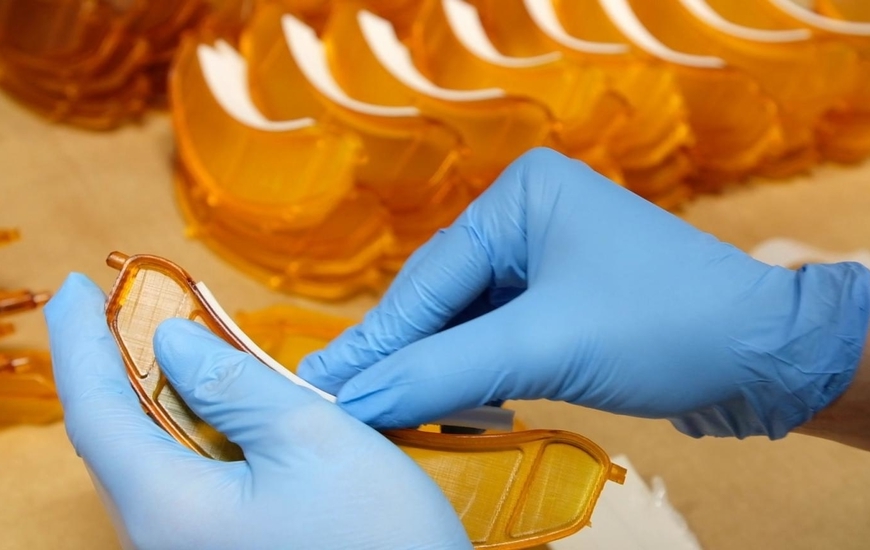Composites Portal and Portale Compositi, in collaboration with the DICAR of the University of Catania, inaugurate a new section dedicated to the articles of the academic world on the most current issues in the composites sector. Below the first contribution.
by GIANLUCA CICALA* and CLAUDIO TOSTO**
In times of Covid-19, entrepreneurs, engineers, technicians and makers from all over the world have applied their skills in a reality never experienced before. Many Additive Manufacturing (AM) companies have contributed to the design and manufacture of Personal Protective Equipment (PPE).
The pandemic forced the evolution of additive printing towards a new development which, if pursued constantly, will allow entering a new dimension in which the concept of Supply Chain will be revolutionized.
For example, some leading 3D printing companies have signed an agreement with AbioGeniX to produce nasopharyngeal swabs on a large scale. To ensure rapid production of vital equipment for hospital operators, Stratasys has installed 60 FDM printers at the University Hospital of Paris (APHP). The latter example demonstrates how AM can revolutionize the manufacturing sector by relocating the production of critical spare parts from the OEM companies and warehouses to the end user with an almost canceled lead time.
An even stronger example of pandemic-related developments was presented in the UK, where the government is calling the manufacturers to convert their production in favor of parts / components that can be used by hospitals (e.g. ventilators, valves, face shields, etc.). As reported by the TCT magazine (Vol. 28, issue 2) "a number of 3D printing companies are believed be amongst the 1,400 businesses which have already pledged their support".
This is the case of Photocentric, a company established in 2002, specialized in the production of photopolymer resins. In 2014 they expanded into the 3D market, developing the first ever use of Liquid Crystal Displays (LCD) in 3D Printing, which won the "Best Development in 3D Printing" at IDTechex 2016 and the "Enabling Innovation" award at the Advanced Engineering show 2016.
The English company produces a wide range of 3D printers, all with LCD screens as a light source. In addition, they are the same producers of daylight resin used in their machines and a wide range of 3D resins for any UV printer from 355 to 405 nm wavelength.
Nowadays, the Photocentric team, moved by the huge need for material to support the fight against COVID-19, has converted its production into a machinery (the "Magna Print Farm ", as they call it) to create something that will certainly not go unnoticed in the AM world: the mass production of over 7 million face shields , 24 hours a day, 7 days a week.
This is why on the company's LinkedIn profile for a few days you can read: "We are on the path to creating the largest quantity of a single item by 3D-printing ever made".
The ambitious case of Photocentric leads us back to the need to make the entire AM Supply Chain flexible in production (the dispersal of "mini-factories" over a wide area), flexible in transport, diversified and aimed at mass production.
Think of the need to produce a high volume of complex components, made up of several parts (venturi valves, protective masks for better face fitting for healthcare workers, etc.), so that the classic machining would be prohibitive both because of the times/tooling costs and geometric complexity (coupling of several parts, threads, hollow parts with variable geometry).
Furthermore, these components should be designed according to the "custom-specified" or "custom-specific" design, that is, they should be adaptable to the user's needs (think of the 3D scan of the faces or the specifications dictated by the user of a given equipment medical). Finally, the manufacture should guarantee the quality of the product made, not only in reference to the material used (for example by using a correct medical grade), but to the whole process (in terms of predictability, precision and reliability).
In short, the COVID-19 has launched a challenge to the whole AM world: complexity, customization and high production volumes constitute a new and interesting business model, the so-called "adaptive manufacturing".
* Professor of Materials Science and Technology (University of Catania)
** PhD Student Polymers and Composites Lab (University of Catania)
-

-
01 July 2020






















